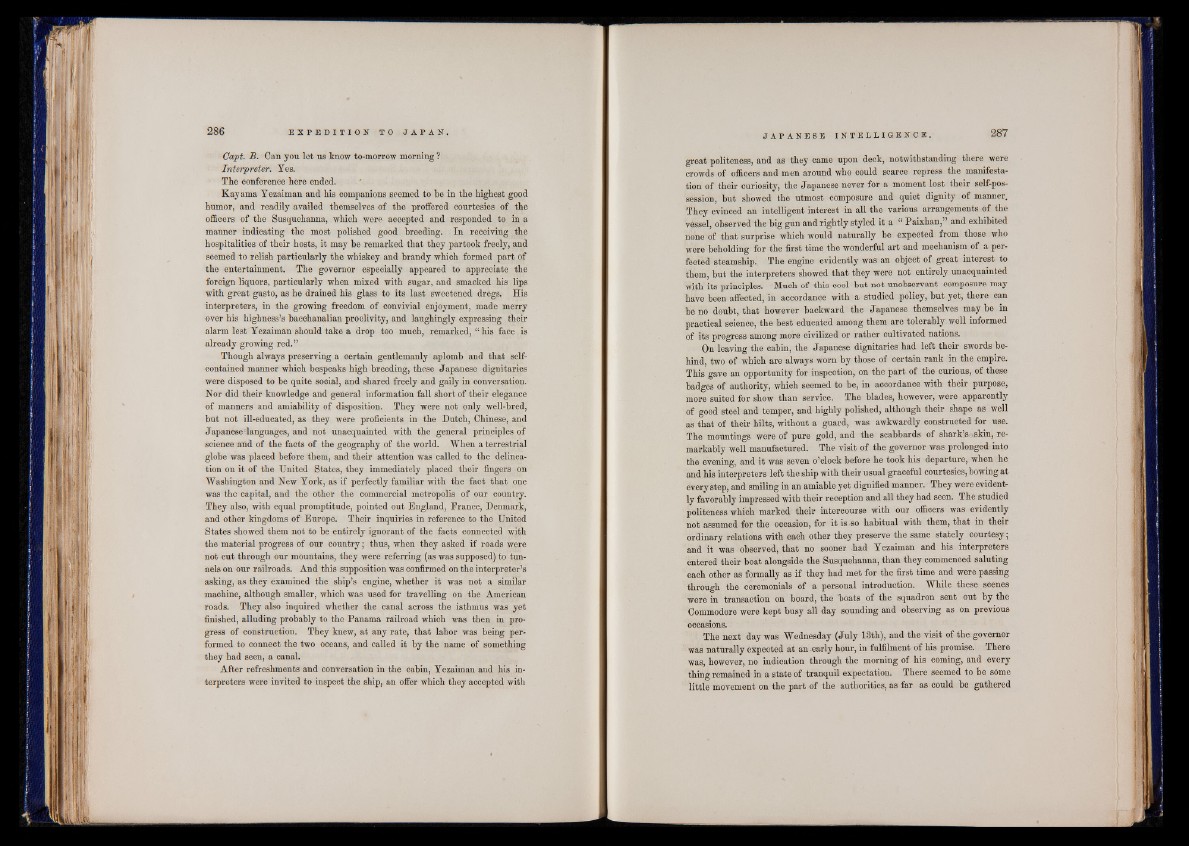
Gapt. B. Can you let us know to-morrow morning ?
Interpreter. Yes.
The conference here ended.
Kayama Yezaiman and his companions seemed to he in the highest good
humor, and readily availed themselves of the proffered courtesies of the
officers of the Susquehanna, which were accepted and responded to in a
manner indicating the most polished good breeding. In receiving the
hospitalities of their hosts, it may be remarked that they partook freely, and
seemed to relish particularly the whiskey and brandy which formed part of
the entertainment. The governor especially appeared to appreciate the
foreign liquors, particularly when mixed with sugar, and smacked his lips
with great gusto, as he drained his glass to its last sweetened dregs. His
interpreters, in the growing freedom of convivial enjoyment, made merry
over his highness’s bacchanalian proclivity, and laughingly expressing their
alarm lest Yezaiman should take a drop too much, remarked, “ his face is
already growing red.”
Though always preserving a certain gentlemanly aplomb and that self-
contained manner which bespeaks high breeding, these Japanese dignitaries
were disposed to be quite social, and shared freely and gaily in conversation.
Nor did their knowledge and general information fall short of their elegance
of manners and amiability of disposition. They were not only well-bred,
but not ill-educated, as they were proficients in the Dutch, Chinese, and
Japanese‘languages, and not unacquainted with the general principles of
science and of the facts of the geography of the world. When a terrestrial
globe was placed before them, and their attention was called to the delineation
on it of the United States, they immediately placed their fingers on
Washington and New York, as if perfectly familiar with the fact that one
was the capital, and the other the commercial metropolis of our country.
They also, with equal promptitude, pointed out England, France, Denmark,
and other kingdoms of Europe. Their inquiries in reference to the United
States showed them not to be entirely ignorant of the facts connected with
the material progress of our country; thus, when they asked if roads were
not cut through our mountains, they were referring (as was supposed) to tunnels
on our railroads. And this supposition was confirmed on the interpreter’s
asking, as they examined the ship’s engine, whether it was not a similar
machine, although smaller, which was used for travelling on the American
roads. They also inquired whether the canal across the isthmus was yet
finished, alluding probably to the Panama railroad which was then in progress
of construction. They knew, at any rate, that labor was being performed
to connect the two oceans, and called it by the name of something
they had seen, a canal.
After refreshments and conversation in the cabin, Yezaiman and his interpreters
were invited to inspect the ship, an offer which they accepted with
great politeness, and as they came upon deck, notwithstanding there were
crowds of officers and men around who could scarce repress the manifestation
of their curiosity, the Japanese never for a moment lost their self-possession,
but showed the utmost composure and quiet dignity of manner.
They evinced an intelligent interest in all the various arrangements of the
vessel, observed the big gun and rightly styled it a “ Paixhan,” and exhibited
none of that surprise which would naturally be expected from those who
were beholding for the first time the wonderful art and mechanism of a perfected
steamship. The engine evidently was an object of great interest to
them, but the interpreters showed that they were not entirely unacquainted
with its principles. Much of this cool but not unobservant composure may
have been affected, in accordance with a studied policy, but yet, there can
be no doubt, that however backward the Japanese themselves may be in
practical science, the best educated among them are tolerably well informed
of its progress among more civilized or rather cultivated nations.
On leaving the cabin, the Japanese dignitaries had left their swords behind,
two of which are always worn by those of certain rank in the empire.
This gave an opportunity for inspection, on the part of the curious, of these
badges of authority, which seemed to be, in accordance with their purpose,
more suited for show than service. The blades, however, were apparent^
of good steel and temper, and highly polished, although their shape as well
as that of their hilts, without a guard, was awkwardly constructed for use.
The mountings were of pure gold, and the scabbards of shark’st>skin, remarkably
well manufactured. The visit of the governor was prolonged into
the evening, and it was seven o’clock before he took his departure, when he
and his interpreters left the ship with their usual graceful courtesies, bowing at
every step, and smiling in an amiable yet dignified manner. They were evidently
favorably impressed with their reception and all they had seen. The studied
politeness which marked their intercourse with our officers was evidently
not assumed for the occasion, for it is so habitual with them, that in their
ordinary relations with each other they preserve the same stately courtesy 5
and it was observed, that no sooner had Yezaiman and his interpreters
entered their boat alongside the Susquehanna, than they commenced saluting
each other as formally as if they had met for the first time and were passing
through the ceremonials of a personal introduction. While these scenes
were in transaction on board, the boats of the squadron sent out by the
Commodore were kept busy all day sounding and observing as on previous
occasions.
The next day was Wednesday (July 13th), and the visit of the governor
was naturally expected at an -early hour, in fulfilment of his promise. There
was, however, no indication through the morning of his coming, and every
thing remained in a state of tranquil expectation. There seemed to be some
little movement on the part of the authorities, as far as could be gathered